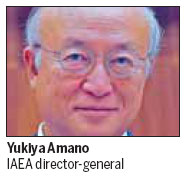Iran urged to engage with talks

The International Atomic Energy Agency is firmly committed to intensifying dialogue and will continue to negotiate with Iran, the chief of the UN nuclear watchdog has said, even though no concrete results have been achieved since November 2011.
"We need to negotiate, of course, but it should produce a concrete outcome and it requires Iran to do so," IAEA Director-General Yukiya Amano told China Daily in Vienna. He was attending the agency's five-day general conference, which opened on Monday.
Amano called on Iran to engage substantively with the IAEA, emphasizing that implementation is the key to resolving the Iranian nuclear issue.
Iran should immediately agree and implement the structured approach proposed by the agency to resolve outstanding issues related to its nuclear program, he said.
Teheran on Monday denied seeking nuclear arms. Iranian nuclear chief Fereydoun Abbasi said in Vienna that his country's nuclear program is aimed only at making reactor fuel and doing medical research.
He said "terrorists and saboteurs" might have infiltrated the agency and might be making decisions covertly.
Commenting on China's role on the issue, Amano said China is playing a constructive part under the "P5+1" (the five permanent UN Security Council members plus Germany) framework related to the Iranian nuclear issue. He applauded China's firm position against nuclear proliferation and its encouragement to countries to abide by international norms.
China has always supported the nuclear non-proliferation efforts of the international community and the nuclear safeguarding activities of the agency, said Wang Yiren, head of the Chinese delegation, in his statement to the IAEA conference on Monday.
The agency should maintain an objective and fair stance, and use diplomacy and dialogue to deal with the Iranian nuclear issue and the Korean Peninsula nuclear issue, Wang said.
China's top legislator, Wu Bangguo, met Iranian President Mahmoud Ahmadinejad during his visit to Teheran last week. Wu reiterated that China remains fair and objective on Iran's nuclear issue.
He said that China is opposed to research, development and possession of nuclear weapons by any Middle East country, but China also believes that a country's right to the peaceful use of nuclear energy should be guaranteed in line with relevant regulations.
The UN Security Council has passed six resolutions, four of which included sanctions. The United States and the European Union have also imposed additional unilateral sanctions on Iran's oil exports.
In May, Amano visited Teheran in hopes of reaching an agreement with the Iranian side, but the visit was fruitless.
Amano said it is obvious that safety standards have been strengthened and nuclear power plants have become safer since the Fukushima crisis in Japan more than a year ago.
But he said more work should be done. "We should not lower our guard," he said.
Amano noted that nuclear power will remain an important part of the global energy mix, though countries such as Germany have decided to phase out nuclear power by 2022. "The use of nuclear power will expand despite the Fukushima accident, but at a slower pace and with more emphasis on nuclear safety."
Contact the writers at lixiang@chinadaily.com.cn and qinzhongwei@chinadaily.com.cn
Xinhua and AP contributed to this story.


















